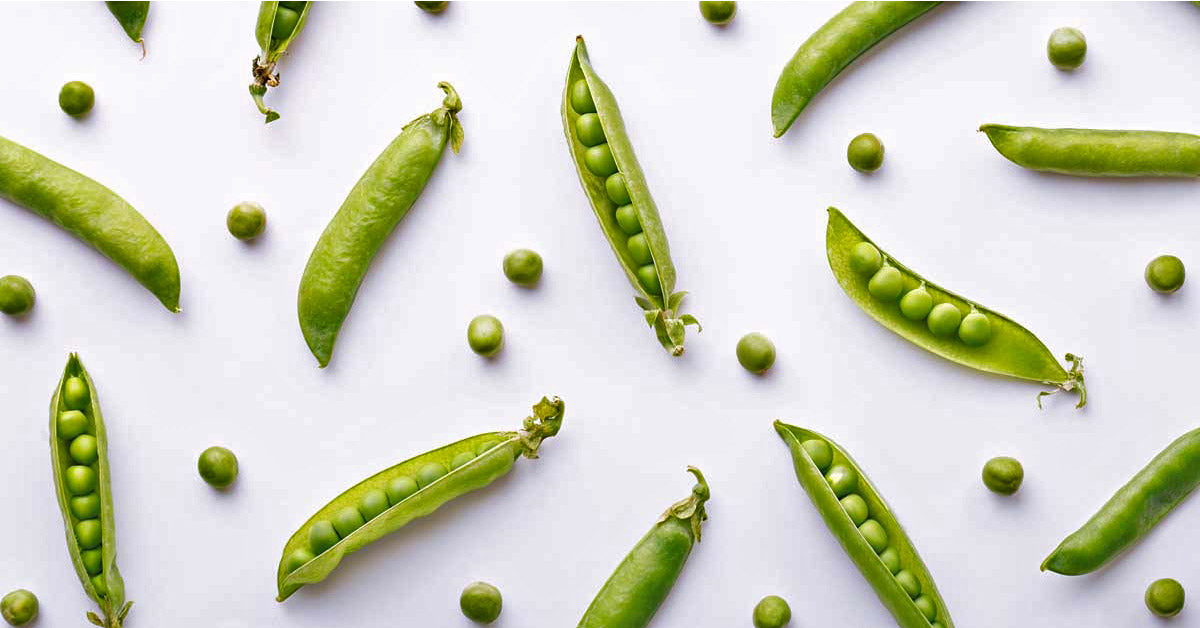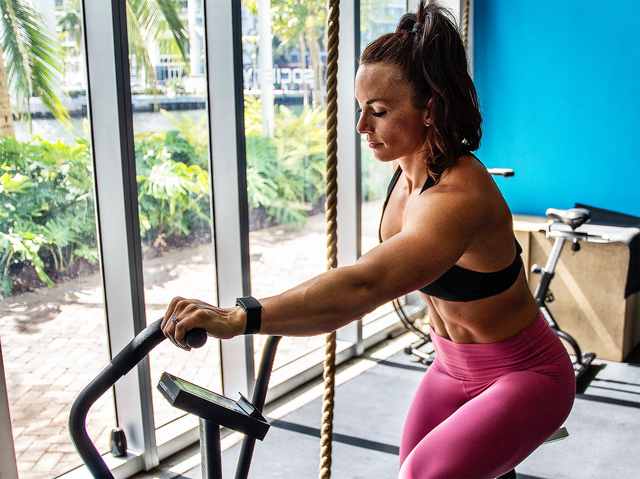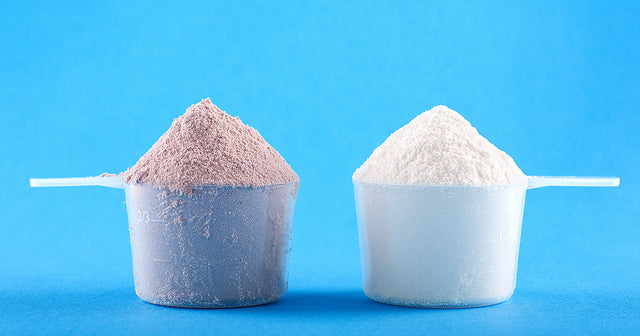The number of plant protein sources is like a revolving door, and the newest trends are constantly evolving. However, not all plant protein sources are created equal and as a consumer it’s important to be informed of what you’re consuming and how it benefits you. Pea protein has proven to be an all-star plant protein source that closely rivals animal sources in amino acid content and its proven ability to improve performance. But what about soy protein? Although extremely versatile and packed with protein, soy gets scrutinized and is often classified as a sub-optimal protein source. We’re going to find out which plant protein source is best for you and your goals, when we compare pea protein vs soy protein.
Comparing The Labels
To start, when you’re looking to buy a nutritional supplement or protein powder, it’s crucial to examine and compare the nutrition labels. While you’re searching for which protein has the most protein content, make sure the protein you select does not contain any proprietary blends or mixes. Products that use blends, do not disclose how much of each ingredient the product contains. So how do you know what you’re supplementing with… you don’t. Make sure the label provides complete transparency, into what ingredients and how much they use.
It’s important to also note how many servings your protein has. Several plant-based options will have lower protein content and fewer servings per container. Make sure you’re getting a fair amount of servings and more than 18g of protein per serving.
What Is Pea Protein?
As the name so aptly suggests, pea protein is derived from peas. Typically, pea protein is made with split peas, or yellow peas, and contains more protein content than other plant protein sources at 90% protein content. The peas are harvested, dried, re-hydrated and the protein is then extracted.
Is Pea Protein A Complete Protein?
Of the 20 amino acids in the human body, nine are classified as essential. Essential, meaning that you must obtain them from your food or through supplements. The food sources that contain all nine essential amino acids are protein sources, typically derived from meat, poultry, or dairy sources. Some plant protein sources, do not contain all nine essential amino acids, thus making them incomplete sources of protein.
Pea protein has an impressive essential amino acid profile, which is paramount to support your athletic performance and goals. Yet, there is an ongoing debate, whether or not Pea Protein is a complete source of protein. Although pea protein contains all nine essential amino acids, technically making it a complete protein, it’s low in the amino acid methionine. As compared to other plant-based protein sources, pea protein is the closest to animal-based protein sources such as whey with a very similar amino acid content.
What Is Soy Protein?
Soy protein is derived from soybeans, is dehulled, the extracted and isolated from the fat. The soybean is classified as a legume and contains no cholesterol and is an incredibly protein-dense. Soy protein made its massive rise in the late 1990s and found itself being used as a protein additive and fortified in many packaged foods such as cereal and granola bars. Soy is also a very popular vegan alternative and is used in tofu, tempeh, and as a dairy alternative in soymilk. Soy beans or Edamame are also a great protein-packed snack.
Soy however is somewhat of a controversial food. While many see soy as a powerhouse food with near super status, others see it as an enemy to your health.
Soy protein contains what’s called, phytates also known as antinutrients, which can decrease mineral absorption specifically iron and zinc. Soybeans also contain Isoflavones or phytoestrogens – chemical compounds that mimic hormones and have estrogen-like properties. However, soy protein is filtered and rinsed which removes nearly all phytoestrogens [R]. None of the evidence thus far, however, shows any positive or negative effects of phytoestrogens [R]. Lastly, the biggest negative drawback is that soy is one of the 8 most common allergens.
Is Soy Protein A Complete Protein?
Soy protein is a complete protein source, and contains all essential amino acids to help training and exercise performance. Pea protein however contains a higher concentration of amino acids than soy protein.
Pea Protein Vs Soy Protein
Macronutrient Differences
Both pea and soy protein are very protein-dense and have around 90% protein content. Pea protein contains 24g of protein per serving, compared to 26g in soy protein. Both are also very low in fat and carbohydrates making them both a great option to optimize body composition.
|
PEA VS SOY PROTEIN (30G) |
||
|
PEA PROTEIN |
SOY PROTEIN |
|
|
CALORIES |
120 |
98 |
|
CARBOHYDRATES |
1 |
2.5 |
|
FAT |
2 |
1 |
|
PROTEIN |
24 |
26 |
|
FIBER |
0 |
2 |
Micronutrient Content
One huge difference between animal and plant protein, are the micronutrients. Pea protein is rich in iron, manganese, folate, copper, phosphorus, vitamins B6, B2, niacin, molybdenum, fiber, and vitamins A, C, and K.
Soy protein is also rich in micronutrients such as phosphorus, manganese, copper, and contains 25% of the recommended daily intake of Iron.
What makes soy a bit more unique than pea protein, is that soy protein contains what’s called isoflavones – compounds with strong hormone-like structure. Yet nearly all these phytoestrogens are extracted during the isolated process when making soy protein powder.
Amino Acid Content
Both Pea protein and soy protein are classified as complete proteins and all essential amino acids to stimulate muscle protein synthesis to build and rebuild muscle mass.
Pea protein has a very similar amino acid mix, as compared to whey protein. Due to its high amount of essential amino acids, specifically arginine, leucine, isoleucine, valine, and alanine (leucine, isoleucine, and valine are the branched-chain amino acids BCAAs, and are known to be most responsible for stimulating muscle protein synthesis), pea protein is an amazing plant-based protein alternative for athletes. Arginine specifically helps facilitate the release of nitric oxide, which increases oxygen and blood flow, translating to increased muscle growth, and better recovery. Pea Protein has nearly three times the amount of arginine than whey protein.
Emerging evidence shows that different types of protein have different effects on muscle protein synthesis and the net rate of muscle growth [R]. The effect may be due to the different amino acid content and composition otherwise known as it’s amino acid score. Studies show that animal protein such as whey, casein, or egg promote MPS better than soy protein alone and support bigger net gains in muscle mass and strength. However, Soy protein contains more L-Glutamine which is proven to help inhibit muscle protein breakdown and accelerate recovery time. Soy like pea protein also contains more arginine, than whey.
RELATED ARTICLE L-Glutamine: The Best Supplement For Recovery
Protein Digestibility
Protein digestibility-corrected amino acid score (PDCAAS) is a method of evaluating the quality of a protein. PDCAAs are based on both the amino acid requirements of humans and their ability to digest it. Most plant proteins have low bioavailability (meaning the body has a hard time absorbing the nutrients). Pea protein isolate, however, ranks at a 0.928, on a scale of 1 being the highest in digestibility. The PDCAA of pea protein is therefore very similar to that of whey, casein, and egg. Soy protein, however, ranks with a PDCAA score of a 1, which is the highest rating.
Digestibility is an important factor when it comes to performance benefits and outcomes. Delivering the essential amino acids, you need post-workout, is vital to rebuild and repair lean muscle mass, to help more muscle and recover faster.
Taste
Now, let’s talk about the real deciding factor – taste. Pea protein has a neutral flavor, mixes very smoothly like whey or whey isolate, and is not chalky in nature as compared to its plant protein counterparts. Soy is very similar to pea in texture and smoothness and is very comparable to other protein sources. Unfortunately, since both pea and soy are so similar in texture, the taste is hard to differentiate.
Pea Protein Vs Soy Protein – In Summary
- Pea protein and soy protein contain all essential and branched-chain amino acids you need for optimal performance. However, pea protein has slightly elevated levels compared to soy.
- Soy protein has slightly more protein per serving than pea protein
- Soy protein is a superior protein source than pea according to its bioavailability and amino acid score which is similar to casein or egg protein. However, studies show that pea protein promotes muscle protein synthesis better than soy protein despite the difference in PDCAA.
- Both Pea protein and soy protein have a neutral flavor and smooth texture
- Soy protein is a common allergen and pea protein is hypoallergenic.
Pea Protein Vs Soy Protein: Takeaway
Both pea and soy protein proves to be great plant-based protein options, regarding protein quality, content, taste, and digestibility. Despite the differences however, pea protein offers more amino acids per serving and is proven to improve performance gains more than soy protein. Despite the negligible and minute differences between the two, if you’re not allergic to soy, tofu, tempeh and edamame are great additions to any type of diet.
At Swolverine, we created PLANTPRO5, which contains pea protein isolate along with hemp, quinoa, sacha inchi, and pumpkin protein, so you can get a mix of the best plant protein sources to help fuel your health and performance.
Swolverine's PLANTPRO5® is the perfect mix of high-quality plant-based protein, to provide the nutrients you need to power your performance. Made with Pea Isolate, Hemp, Pumpkin Seed, Sacha Inchi, and Quinoa Protein, PLANTPRO5® provides 21g of the protein you need to increase strength, build more lean muscle mass, and optimize performance. With a delicious Chocolate Cake flavor, PLANTPRO5® Is the perfect addition to your plant-based diet.
SWOLVERINE IS AN ENDURANCE ATHLETE AND ACTIVE LIFESTYLE BRAND. MADE FOR THE ELITE ATHLETE, AND THE STRONG-WILLED OUR PRODUCTS WERE DESIGNED TO FUEL YOUR ATHLETIC PERFORMANCE. WE PERFORM WHEN YOU PERFORM.
We believe that everyone can optimize not only their athletic performance but their human potential. The way we believe we can optimize performance is through transparency, clinically effective doses, and clinically proven ingredients with evidence-based outcomes. We provide the nutrients you need to power your active lifestyle.
References
Montgomery, Kristen S. “Soy protein.” The Journal of perinatal education vol. 12,3 (2003): 42-5. doi:10.1624/105812403X106946
Phillips, Stuart M et al. “The role of milk- and soy-based protein in support of muscle protein synthesis and muscle protein accretion in young and elderly persons.” Journal of the American College of Nutrition vol. 28,4 (2009): 343-54. doi:10.1080/07315724.2009.10718096
Butteiger, D N et al. “A soy, whey and caseinate blend extends postprandial skeletal muscle protein synthesis in rats.” Clinical nutrition (Edinburgh, Scotland) vol. 32,4 (2013): 585-91. doi:10.1016/j.clnu.2012.10.001
Jargin, Sergei V. “Soy and phytoestrogens: possible side effects.” German medical science : GMS e-journal vol. 12 Doc18. 15 Dec. 2014, doi:10.3205/000203
Gorissen, Stefan HM et al. “Protein content and amino acid composition of commercially available plant-based protein isolates.” Amino acids vol. 50,12 (2018): 1685-1695. DOI:10.1007/s00726-018-2640-5
Babault, Nicolas et al. “Pea proteins oral supplementation promotes muscle thickness gains during resistance training: a double-blind, randomized, Placebo-controlled clinical trial vs. Whey protein.” Journal of the International Society of Sports Nutrition vol. 12,1 3. 21 Jan. 2015, doi:10.1186/s12970-014-0064-5
Banaszek, Amy et al. “The Effects of Whey vs. Pea Protein on Physical Adaptations Following 8-Weeks of High-Intensity Functional Training (HIFT): A Pilot Study.” Sports (Basel, Switzerland) vol. 7,1 12. 4 Jan. 2019, DOI:10.3390/sports701001
Fang, S. Yu et al., J Agric Food Chem., 52(12), pp. 4012-4020 (2004)
Fernandez-Quintela, M.T. Macarulla et al., Plant Foods Hum Nutr., 51(4), pp. 331-342 (1997).














